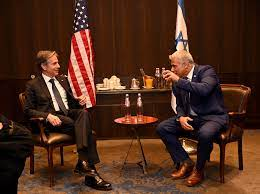13 October 2021
Marwan Dalal
American Secretary of State Antony Blinkin’s meeting today with Israeli and UAE Ministers of Foreign Affairs Yair Lapid and Sheikh Abdullah bin Zayed is designated to discuss various issues including regional security and stability. It seems that the President Biden will not meet the Israeli Foreign Minister during this trip in what is considered a diplomatic snub to the close ally.[1] However, the United States will maintain its political, military, and cultural backing to Israel despite its proven record of persistent human right violations, chief among them denying the Palestinian people the right to self-determination, perpetrating war crimes, and applying a notorious regime of Apartheid against them.
The peace agreement between Israel and the UAE was signed during President Trump’s tenure. The same period witnessed the signing of three other agreements between Israel and Arab countries forming diplomatic relations (Bahrain, Sudan, and Morocco). It was not the first time, before and after the 1993 Oslo Accords between the PLO and Israel, that the United States utilized its military and financial superiority to advance or impose agreements in the Middle East preferring Israel’s interests. The two Gulf countries UAE and Bahrain have been engaged in close cooperation with Israel prior to the formal agreements considering Iran as a common rival.
Some Arab countries claim that relations with Israel provide a diplomatic measure to influence the rights of Palestinians. Given the experience since the 1979 Egypt – Israel diplomatic agreements it is safe to say that two conclusions are evident: no such influence has been demonstrated and Israel justifiably remains an outcast in the popular imagination of the region considering its treatment of the Palestinians. Israelis either colonially and culturally negate the region’s history and Israel’s destructive role in it or are simply idle. Politically, the agreements are used as an indication that the Palestinians are not a primary issue for Arab governments, which is not necessarily a false statement.
The setting for the Trump era diplomatic breakthrough is exceptional in its hostility to the Palestinians since the Oslo accords. In fact, they are an attempt to isolate the Palestinians from possible diplomatic support and increase the pressure exerted on the Palestinian leadership since Oslo to succumb to Israel’s demands that fall short of the minimum mandated by international law. The effort was led by three American Jewish supremacists supporters of Israel: Jared Kushner, Jason Greenblat/Avi Berkowitz, and David Friedman in close collaboration with former Secretary of State Mike Pompeo, who shares his own deep messianic commitment towards the country. In the background was of course the former mega donor to the republican party Sheldon Adelson whose intimate ties to the Israeli Likud party dwarfed his Republican ideology.
In addition to attempting to squeeze the Palestinians by cutting various channels of humanitarian aid, the Trump administration also acknowledged Occupied East Jerusalem as capital of Israel and granted Israel sovereignty over the occupied Syrian Golan heights in egregious violation of international law. Cancelling the 2015 deal reached with Iran during the Obama administration regarding its nuclear weapons was another Sheldonian moment of climax for this administration.
One of the topics that Blinken is supposed to discuss with his counterparts from Israel and UAE is the possibility of reinstating the agreement with Iran. Undoubtedly, the Iran – Gulf countries problematic enmity provide the American military with the possibility to increase weapons sales to its allies in the region. Whether the shadows of American diplomacy and the American military’s “clash of explosions” strategy played a role in instigating armed conflicts in the region require additional research. The American assassination of an Iranian General in January 2020 was clearly an illegal conduct that constituted an act of aggression in violation of article 2(4) of the United Nations Charter. A number of Iranian scientists have been assassinated in Iran in mysterious circumstances and American military’s cyber-attacks against the country are regular.
The 2015 agreement between Iran and six other countries (UK, France, China, Russia, Germany, and United States), relieved the country from certain economic sanctions in return for pursuing a non-militarized nuclear program.
It is not understandable why Israel should enjoy the close status of cooperation with the
United States regarding Iran. The first and only nuclear country in the Middle East Israel has been benefitting from complete impunity regarding its weapons of mass destruction. The 1968 Treaty on the Non-Proliferation of Nuclear Weapons (NPT) is the international legal framework. 191 countries have signed the treaty which came into force in 1970. Iran signed the treaty in 1968 and ratified it in 1970. To this day Israel has not joined the treaty. The objective of the treaty is to limit the use of nuclear technology for peaceful purposes as opposed to developing or disseminating this technology as a weapon.
Israel’s possession of nuclear weapons is a given in Israel. The revelations of a worker in Israel's nuclear plant Mordechai Vanunu in the British Press in the 1980s of the previous century and Israel’s response are one example of many regarding Israel’s nuclear capacity.[2] The United States is aware of Israel’s nuclear weapons.[3]
Israel will interpret the complete or nearly total American diplomatic, military, economic, and cultural support as an invitation to maintain its aggressive policies against the region generally, and to enhance its violations of the rights of Palestinians in particular. Subsequent consequences should not be surprising.

Blinken and Lapid
[1] An awkward occurrence that insults American officials who met the Israeli Foreign Minister, more than advancing any diplomatic purpose.
[2] Duncan Campbell, “The Guardian profile: Mordechai Vanunu”, The Guardian, 16 April 2004. See also Gili Cohen, “Dimona Chief: Cancer Rates at Nuclear Plant Similar to Those of General Public”, Haaretz, 4 May 2015.
[3] Julian Borger, “The truth about Israel’s secret nuclear arsenal”, The Guardian, 15 January 2014.
Comments